How To Get Excel To Stop Rounding
- Login
- Cart
- Training
- Videos
- Functions
- Formulas
- Shortcuts
- Blog
Excel ROUND Function
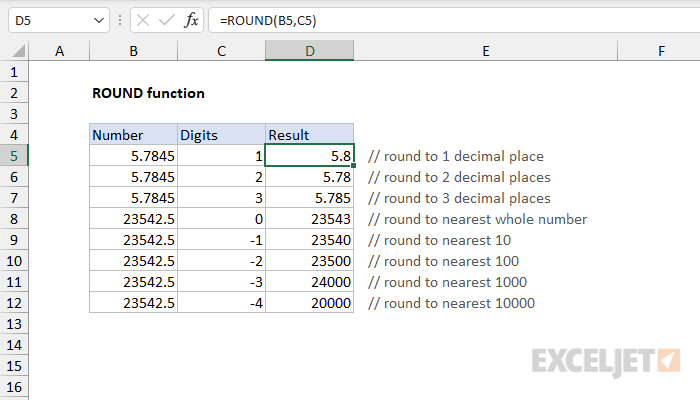
Summary
The Excel ROUND function returns a number rounded to a given number of digits. The ROUND function can round to the right or left of the decimal point.
Purpose
Round a number to a given number of digits
Syntax
=ROUND (number, num_digits)
Arguments
- number - The number to round.
- num_digits - The place at which number should be rounded.
Usage notes
The ROUND function rounds a number to a given number of places. ROUND rounds up when the last significant digit is 5 or greater, and rounds down when the last significant digit is less than 5.
ROUND takes two arguments, number and num_digits. Number is the number to be rounded, and num_digits is the place at which number should be rounded. Whennum_digits is greater than zero, the ROUND function rounds on the right side of the decimal point. Whennum_digits is less or equal to zero, the ROUND function rounds on the left side of the decimal point. Use zero (0) for num_digits to round to the nearest integer. This behavior is summarized in the table below:
| Digits | Behavior |
|---|---|
| >0 | Round to nearest .1, .01, .001, etc. |
| <0 | Round to nearest 10, 100, 1000, etc. |
| =0 | Round to nearest 1 |
Round to right
To round values to the right of the decimal point, use a positive number for digits:
= ROUND (A1, 1 ) // Round to 1 decimal place = ROUND (A1, 2 ) // Round to 2 decimal places = ROUND (A1, 3 ) // Round to 3 decimal places = ROUND (A1, 4 ) // Round to 4 decimal places
Round to left
To round down values to the left of the decimal point, use zero or a negative number for digits:
= ROUND (A1, 0 ) // Round to nearest whole number = ROUND (A1, - 1 ) // Round to nearest 10 = ROUND (A1, - 2 ) // Round to nearest 100 = ROUND (A1, - 3 ) // Round to nearest 1000 = ROUND (A1, - 4 ) // Round to nearest 10000
Nesting inside ROUND
Other operations and functions can be nested inside the ROUND function. For example, to round down the result of A1 divided by B1, you can ROUND in a formula like this:
= ROUND (A1/B1, 0 ) // round result to nearest integer
Any formula that returns a numeric result can be nested inside the ROUND function.
Other rounding functions
Excel provides a number of rounding functions, each with a different behavior:
- To round with standard rules, use the ROUND function.
- To round to the nearest multiple, use the MROUND function.
- To round down to the nearest specified place, use the ROUNDDOWN function.
- To round down to the nearest specified multiple, use the FLOOR function.
- To round up to the nearest specified place, use the ROUNDUP function.
- To round up to the nearest specified multiple, use the CEILING function.
- To round down and return an integer only, use the INT function.
- To truncate decimal places, use the TRUNC function.
Notes
- The ROUND function rounds to a specified level of precision, determined by num_digits.
- If number is already rounded to the given number of places, no rounding occurs.
- If number is not numeric, ROUND returns a #VALUE! error.
Related functions
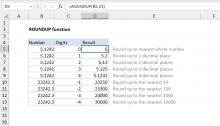
The Excel ROUNDUP function returns a number rounded up to a given number of decimal places. Unlike standard rounding, where only numbers less than 5 are rounded down, ROUNDUP rounds all numbers up.
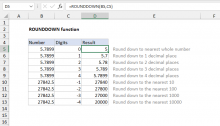
The Excel ROUNDDOWN function returns a number rounded down to a given number of places. Unlike standard rounding, where only numbers less than 5 are rounded down, ROUNDDOWN rounds all numbers down.
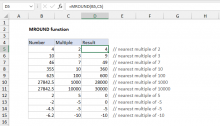
The Excel MROUND function returns a number rounded to a given multiple. MROUND will round a number up or down, depending on the nearest multiple.
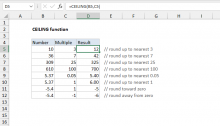
The Excel CEILING function rounds a given number up to the nearest specified multiple. CEILING works like the MROUND function, but CEILING always rounds up.
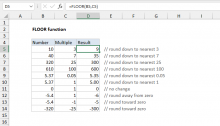
The Excel FLOOR function rounds a given number down to the nearest specified multiple. FLOOR works like the MROUND function, but FLOOR always rounds down.
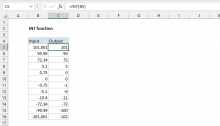
The Excel INT function returns the integer part of a decimal number by rounding down to the integer. Note that negative numbers become more negative. For example, while INT(10.8) returns 10, INT(-10.8) returns -11.
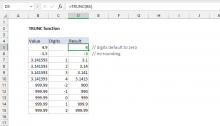
The Excel TRUNC function returns a truncated number based on an (optional) number of digits. For example, TRUNC(4.9) will return 4, and TRUNC(-3.5) will return -3. The TRUNC function does no rounding, it simply truncates as specified.
Download 100+ Important Excel Functions
Get over 100 Excel Functions you should know in one handy PDF.
Excel video training
Quick, clean, and to the point.
Learn more
How To Get Excel To Stop Rounding
Source: https://exceljet.net/excel-functions/excel-round-function
Posted by: mitchellexceplicted.blogspot.com

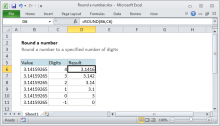
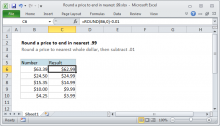
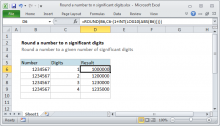
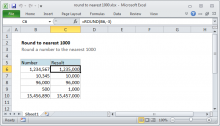
0 Response to "How To Get Excel To Stop Rounding"
Post a Comment